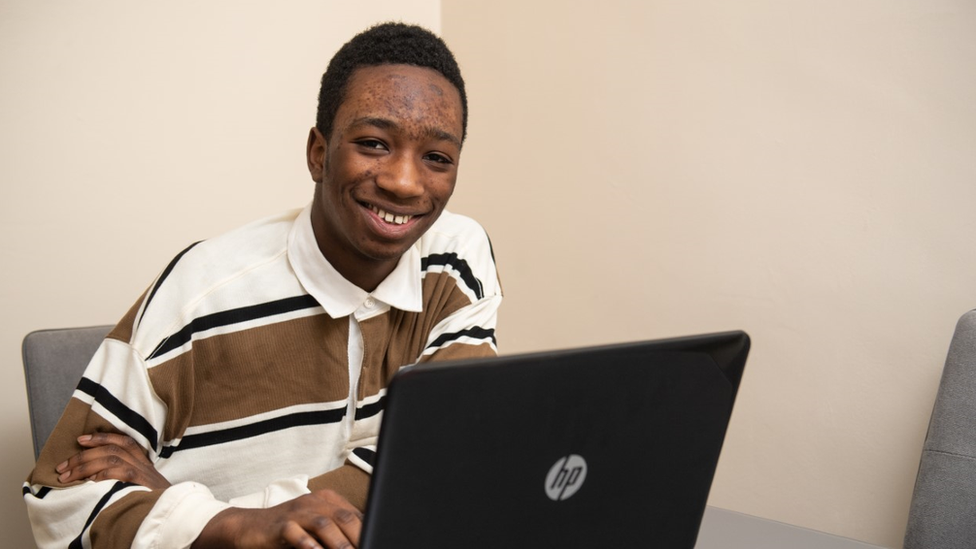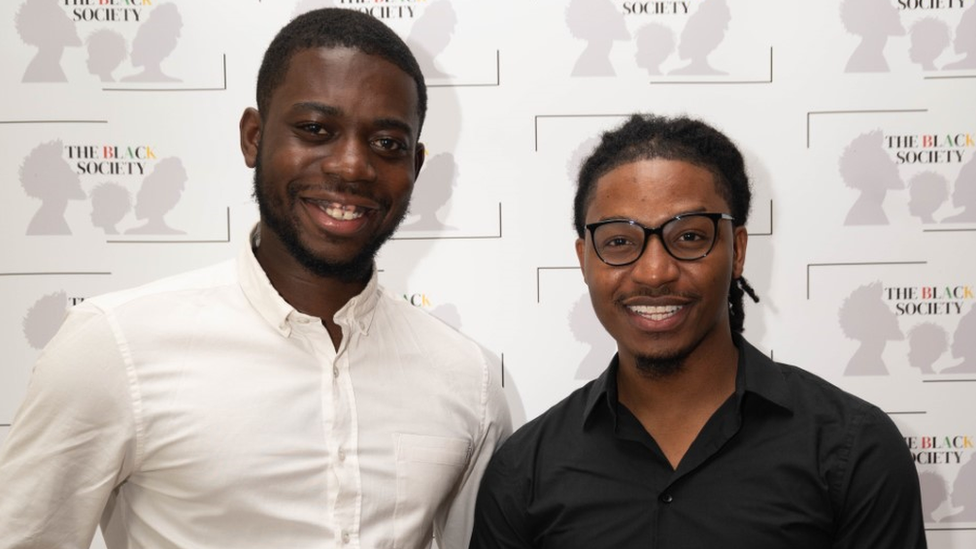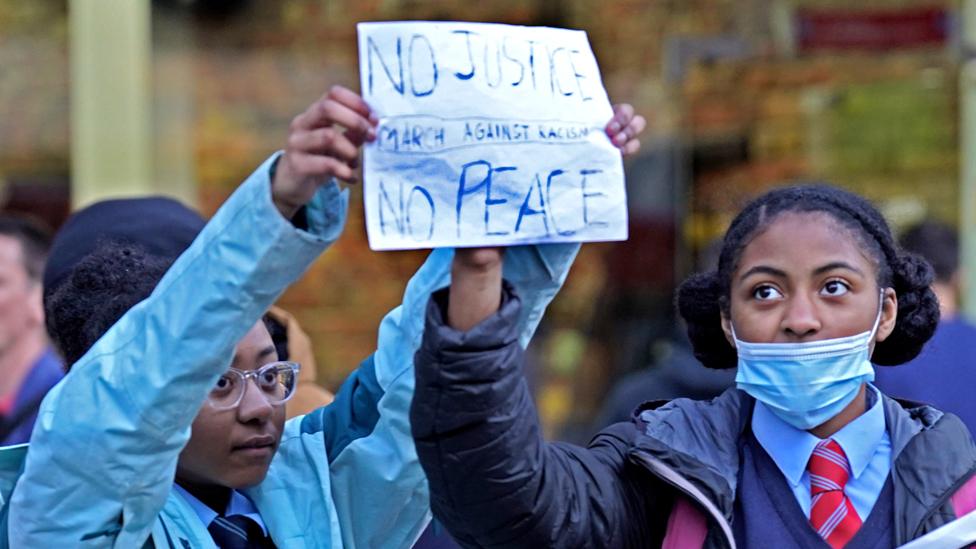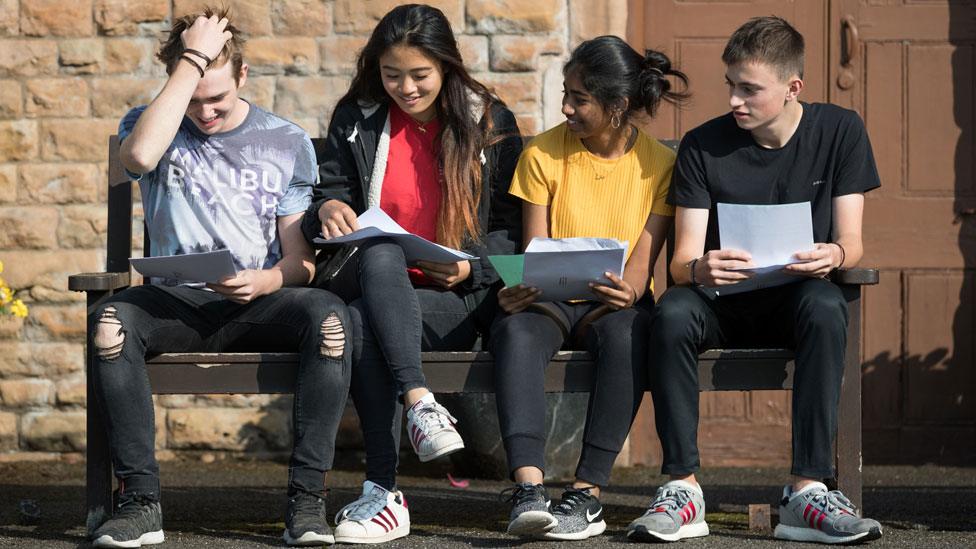BBC Young Reporter: 'Why don't more teachers look like me?'
- Published

David investigated why there's such a lack of ethnic diversity in teaching
Statistics show that teaching as a profession is overwhelmingly white and female. After winning the BBC Young Reporter competition, I worked with BBC News to look at why there's such a lack of diversity in teaching, and what it means for pupils like me.
I'm 14, and have moved around a bit - I was born in London but now I live in Manchester, two very diverse cities. This means I've been to a few different schools already.
Despite this, I went through all of primary school without ever having a non-white teacher.
I'm black - my parents are both originally from Ghana - but I don't really see myself represented in the people who teach me.
I already know all too well what the impact is on pupils. When you're my age, you're starting to think about what you want to do when you leave school. You look at different jobs and careers and try to picture yourself doing them.
If you don't see people in those jobs who look like you, who have similar backgrounds and experiences to you, then it's really hard to imagine yourself doing that job.
I have friends who are from ethnic minority backgrounds who'd like to be teachers - but the lack of representation is putting them off.
It's not just about inspiring young people to become teachers, either. As pupils, it's really important for us to have someone we can talk to that understands our experiences, who we can confide in.
There can be even more serious consequences of not having diversity in teaching. During the Covid pandemic, when pupils' GCSE and A-level results were based on teacher assessment, I was worried to read that minority ethnic pupils' grades could have been affected by bias.
I was also disturbed to hear about what happened to Child Q - a young black pupil who was strip-searched in a school in east London earlier this year - and later to find out that this apparently isn't an isolated occurrence.
All of this just goes to show how important it is for black children in particular to have that representation.
We know that teaching is predominantly white - according to one study from UCL, released in 2020, almost half of schools in England and Wales have no ethnic minority teachers at all, even in diverse areas with a lot of black and Asian pupils. But what I wanted to find out is why, and what can be done to change this.
46%of schools have no minority ethnic teachers, including in ethnically diverse areas
16%- schools where more than 20% of their teachers are from minority ethnic backgrounds
15%have between 10% and 20% of teachers from minority ethnic backgrounds
We spoke to two teachers - Johnoi Josephs and Albert Adeyemi. They agree that the lack of diversity in teaching is a major issue - that, they told us, is why they co-founded their campaign group Black Men Teach.
As well as providing a support network for black male teachers, they also mentor young people who might be thinking of teaching as a career, and give talks at schools and conferences about the importance of diversity and equality.
Mr Josephs said he sees his role as "shaping a positive experience of black males" for pupils.
Mr Adeyemi agreed: "Staff need to be culturally intelligent, so students aren't just left with an image of black people that's based on what's portrayed to them in the media. That's the issue we have, even in the most diverse areas."
The problem, they said, is that diversity often doesn't reach the level of senior leadership.
Despite working at a school in south London, where "white students are consistently the minority", Mr Josephs said black teachers aren't represented at senior levels.
"Classroom-based teachers and support staff are very diverse. Middle leaders are very diverse. But the School Leadership Team is not diverse at all."
He said that he and Mr Adeyemi know of schools in London that have black head teachers, and are very diverse at all levels.

Albert Adeyemi [L] and Johnoi Josephs co-founded the group Black Men Teach
The 2020 UCL study found the same thing - that even in diverse areas, senior leadership teams at schools weren't representative.
Prof Alice Bradbury, co-author of the study, told us there's "a big issue with teacher retention in general… but teachers from minority backgrounds tended to have even lower retention rates than white British teachers".
Teachers told her that they felt there was a glass ceiling.
"There was a feeling that there was a sort of point at which the barriers started to come up," she said. "That it was noticeable that the senior leadership teams were not as diverse as the rest of the school."
Minority teachers, she said, described feeling pushed into more pastoral roles, even when they wanted to do more academic work.
"They weren't seen as academic enough to get into senior leadership, because they had done far more pastoral roles," she said. "I think it's to do with stereotyping."
I was worried that it was all bad news. But according to Mr Josephs and Mr Adeyemi, progress is happening behind the scenes - albeit slowly. And Prof Bradbury told us she has been presenting her research to schools in an effort to bring about positive change.
My hope is that by the time my generation enters the workforce, education is a more attractive option for us, so that minority ethnic pupils have more teachers to look up to.
Additional reporting by Ashitha Nagesh
You can find stories by other young people on the BBC Young Reporter website.
- Published29 April 2022

- Published11 July 2020

- Published8 August 2022
